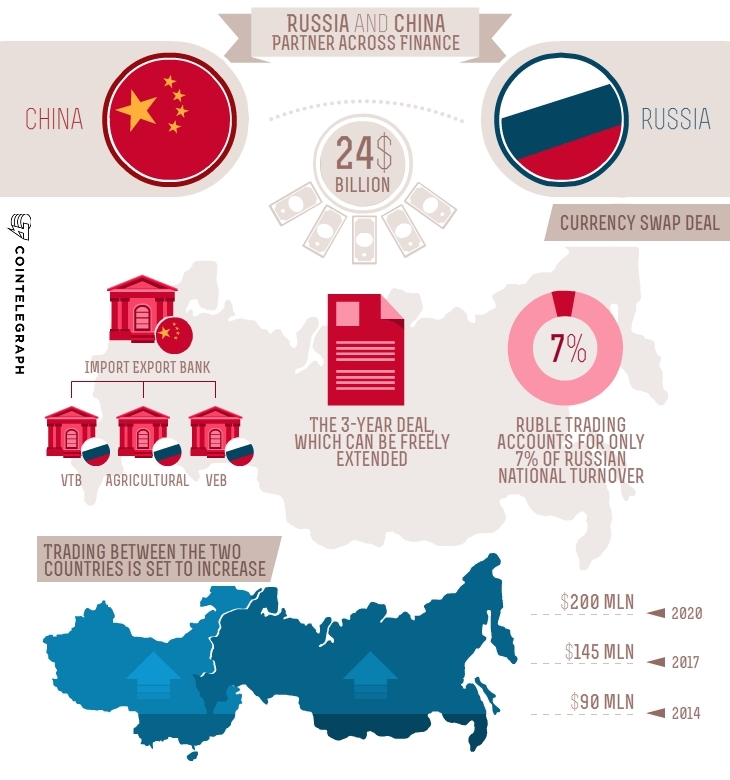In the wake of continued sanctions, Russia is turning to China to provide new financial possibilities, with signing a currency swap deal worth 150 billion Yuan (US$24.5 billion) and other measures.
Given the increasingly hostile international environment, both countries are keen to “expand the practice of using national currencies in trade,” Russian Prime Minister Dmitry Medvedev said at the 18th annual Russian-Chinese Commission, adding that at present ruble trading accounts for only 7% of Russian national turnover.
The 3-year deal, which can be freely extended, comes amid growing support for Russia’s economy from financial institutions in China, Russia Today reports. Notably, Import Export Bank is providing loans to Russia’s VTB Bank, VEB (Vnesheconombank) and the Russian Agricultural Bank. The VTB package alone is worth US$2 billion.
Trading between the two countries is set to increase sharply in line with the various partnerships being set up, and the figure is set to reach US$200 billion in the next six years from US$90 billion in 2014.
Private finance is also set to benefit, with China-based card issuer China UnionPay looking to markedly increase its activities in Russia in the short term. The cards it issues already operate in 142 countries and surpass both MasterCard and Visa in terms of world trade turnover.
Now, over 2 million cards are set to be introduced to Russia, with consumers increasingly seeing an absence of a MasterCard or Visa logo on their plastic.
“Visa and MasterCard have 100 percent trust, but right now, there is no trust in the system, and many, even our clients, have shifted their transactions from American dollar and Euro to Yuan,” Denis Fonov, Deputy Chairman at LightBank, which already has a stockpile of 10,000 China UnionPay cards told Russia Today.
The move will capitalize on the friendly relations between the two nations will providing a chance for Russia to accelerate its independence from US-based systems. All this is prior to releasing its own payment network in the coming years, but this is speculated not to arrive until at least 2016.

Meanwhile, Russian lawmakers’ taste for indiscriminate bans appears to be continuing, and this time it’s the cornerstones of consumer technology coming under fire. From 1 January, federal law will require all personal data on Russians to be stored on Russian territory, with the result that companies such as Apple, Facebook and Twitter could be locked out of the market.
“However, skepticism of the total ban on Western gadgets and online resources is not shared by all,” news agency APR Press adds.
Apple currently stores user data on the iCloud, which in turn is hosted on servers in the US. Moving data repositories – servers and software – to Russian territory, would be a costly a protracted operation.
Added to this is the situation which would present if Russia’s information storage requirement forced Apple to cease operating. A ban on Apple would mean a ban on Apple Pay, along with foreign based payment services like PayPal and the like.
While a ban of any sort is an opportunity for Bitcoin, the quashing of its main competitors would turn the Russian market into an interesting testing ground.
While Bitcoin is flying in the face of a Russian ban and Chinese hostility, it is from this Chino-Russian accord that other decentralized alternatives could well profit.
The sums involved nonetheless do not point to a political relationship built on trust; a trustless technology, such as OpenBazaar, would be an interesting experiment in the environment. Whether possible on any level, Bitcoin’s persistence in both countries reveals support, which has the technological knowledge and flexibility to embrace profitable alternatives. While the war wages for fiat payment network supremacy, behind the scenes, things look equally frenetic.
